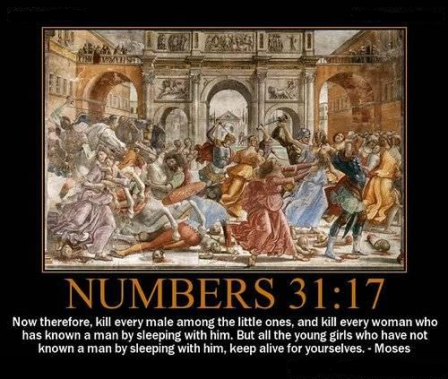
One of the great philosophical debates (and the first thing you learn in any Intro to Philosophy class) is about deontological vs. utilitarian morality: Are “right” and “wrong” a result of certain actions being inherently right or wrong (killing and stealing are wrong in principle) or is it determined based on the consequences of those actions (killing and stealing are wrong because of the harm they do to others)? Or, in even more simplified form, when it comes to “right” and “wrong” do the ends justify the means?
Traditionally, these two approaches to morality seem to line up pretty closely with debates surrounding religious vs. secular morality. Either we should obey the commandments because God commands us to, since through his divine authority he has determined what is “right” or “wrong” via cosmic fiat, and going against those divine dictates is, quite simply, wrong (Euthyphro’s Dilemma be damned), or we should follow secular/humanistic ethics, which generally consider right/wrong to be based on the real-world consequences of our actions, meaning in some cases it may be permissible–even morally obligatory–to perform acts which may otherwise be considered “immoral” (a parent stealing medicine to save the life of his child, for example).
Traditionally, this leads to the notion that secular/humanistic/utilitarian ethics means that the ends justify the means, and as long as the final outcome is beneficial the methods you use to get there are ultimately irrelevant (think Watchmen’s Ozymandias).
But it seems to me that in a way, this dichotomy is precisely backwards, and not only do the “ends justify the means” when it comes to traditional religious morality, but they do so to a literally infinite degree, and that’s for one reason: Because the traditional concepts of “Heaven” and “Hell” introduce the element of infinity to the equation, with notions of everlasting infinite torment or everlasting infinite bliss; and when you perform the cost/benefit analysis on anything involving infinity, the answer is always similarly infinite (math nerds like me might point out exceptions like series of infinite sums which converge on finite numbers, but obviously that doesn’t apply in this case).
So what does that mean? It means that any amount of harm you do to anyone—lying, killing, even torture or mass murder—pales in comparison to the harm you can inflict on someone by causing them to go to hell. Infinitely so. Even increasing the odds of someone going to Hell by a miniscule fraction of a percent is still a transgression of infinite harm, since even .00001% of infinity is still infinity.
And the same goes for heaven; no matter how much good you may do in the world, it will be infinitely trivial compared to even one act which increases the odds of someone reaching Heaven.
Even more disturbingly, the flipside is also true: any action, no matter how abhorrent, is perfectly acceptable in the Heaven/Hell equation, and the ends ALWAYS justify the means provided that the end goal is helping others reach heaven or avoid hell since that end goal is literally a positive of infinite value.
Of course thankfully, with the exception of religious extremists, nobody really applies this logic to their day to day lives, or actually considers these implications and takes their beliefs to the logical extreme.
And we all should hope it remains that way.
Follow-up: Sacrificing One’s Soul






 penalty, for example, but that says nothing about whether they believe the death penalty exists. And as absurd as that interpretation may sound, it plays directly into the mindset of countless religionists who claim that atheists know deep down that God exists, but we simply choose to “reject Him”. Also notice how the wording is subtly yet inherently biased in theists’ (particularly monotheists) favor, while making the subtle presupposition that the existence of their god–particularly the Judeo-Christian God–is somehow the default position. That’s why I prefer the slightly more wordy (but far more accurate) “I don’t believe in the existence of any gods” (of course, if you really want to get under a theist’s skin, there’s also “I don’t believe in the existence of your god”).
penalty, for example, but that says nothing about whether they believe the death penalty exists. And as absurd as that interpretation may sound, it plays directly into the mindset of countless religionists who claim that atheists know deep down that God exists, but we simply choose to “reject Him”. Also notice how the wording is subtly yet inherently biased in theists’ (particularly monotheists) favor, while making the subtle presupposition that the existence of their god–particularly the Judeo-Christian God–is somehow the default position. That’s why I prefer the slightly more wordy (but far more accurate) “I don’t believe in the existence of any gods” (of course, if you really want to get under a theist’s skin, there’s also “I don’t believe in the existence of your god”).